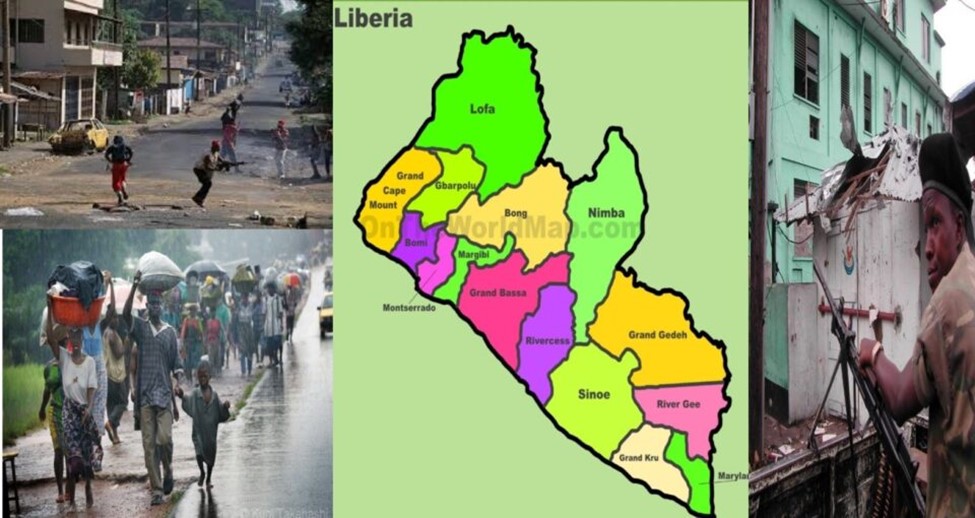Stop Fantasizing Prospect Of Another Civil Unrest
By Frank Sainworla, Jr., fsainworla@yahoo.com
Liberia has had more than its fair share of “popular people’s uprising” “civil unrest” over past decades—but where have they taken this nation today?
A Journalism scholar once said that the press is here to warn and not to bite—to warn of impending danger. In some of my pieces published since Liberia’s 14-year-old brutal civil war officially ended in August 2003, this writer has repeatedly urged fellow compatriots to learn the bitter lessons from the past.
But it seems that many, both in the political establishments and outside of governments, appear to be oblivious to what the so-called people’s uprising or civil unrest has done to the country’s socio-economic and political fabric, just imagine, some 22 years on, Liberia is still considered a fragile state.
One Post-war government after another, this small West African nation is still grappling will how to address key underlying causes of the civil war, which started on the eve of Christmas in 1989—rampant corruption, injustice, greed for power and wealth, disunity.
Both former President Ellen Johnson Sirleaf and her successor, ex-President George Manneh Weah unfortunately failed to fight the corruption “vampire” nor to score success in reconciliation. Their successor too, current President Joseph Nyuma Boakai’s nearly two years in power seems to be heading down the same path.
To date, ordinary Liberians are yet to get the socio-economic and political dividend of civil unrest/popular people’s uprising. In fact, it has taken this nation “back over one hundred years”, as a former US State Department official said amidst the civil war in the 1980s.
Many of our officials and others who had visited one of the former war-ravaged countries like Rwanda return home reciting the chorus of the contrast—a society that practically demonstrates they have learnt the bitter lessons of their past.
Playing with fire: Toying with Nepal’s recent bloody “people’s uprising”
This is why as a patriotic Liberian first besides being an independent Journalist and a trained broadcaster, I know the power of radio,
it is troubling to hear some local radio talk show hosts setting the agenda by toying with a prospect of what recently played up on the streets of Nepal to be replicated here. And of course, chiming in with the flow are some of their thousands of their listeners/followers, many of whom are regime critics, opposition stalwarts or maybe some disenchanted supporters of Boakai’s “rescue” government.
Now, given the gullibility of the Liberian society, repeatedly toying with the idea of copycatting the Nepal event is dangerous and amounts to playing with fire, especially so when most of the presentations are void of providing the contextual framework.
In fact, remember the days when well-known politicians and “progressives” put AK-47 and other dangerous weapons in the hands of citizens (many of them children) without equipping them with political socialization. But they were brainwashed into thinking they were “freedom fighters”.
Listening to some of the radio shows in question, one can sense that there’s little or no appreciation of the fact that what Nepalese have been going through is no new terrain for Liberia.
Contemporary Liberian history teaches us that bloodbaths have played out on the streets of Monrovia and other parts dating back to the April 14, 1979, rice riot which culminated into the April 12, 1980, bloody military coup that saw the assassination of former President William R. Tolbert, Jr. and the execution of 13 other top officials by firing squad. Indeed, both of the two major showdowns were held under the headline “people’s popular uprising”, “civil disobedience” or “civil unrest”.
Caveat
Some of the incendiary rhetoric heard nowadays on some of the local radio shows post-Nepal unrest are heard both on the pro-CDC party stations (Kings FM, Freedom FM and Voice of Liberia) as well as surprisingly government-run ELBC Nightline Liberia and Class Reloaded shows.
Indeed, some Liberians should stop trying to think we can copycat Nepal’s civil unrest, without contextualizing the enormous implications of which this nation is a living testimony.
Let the enthusiasts of a Nepal replica go back into history and reflect on the “Arab Spring” in the 2000s—people’s popular uprisings in the North African states of Tunisia, Egypt and Libya many years ago.
Finally, Liberia has had more than its fair share of “popular people’s uprising” “civil unrest” over past decades—but where have they taken this nation today?
Instead of toying with the idea on how to replicate the Nepal situation, opposition elements and disenchanted “rescue” regime supporters must veer towards stepping up public education of this largely gullible society regarding using the constitutional route to remove leaders who are not delivering the political goods.
Instead of playing out the removal of a government on the streets, post-conflict Liberian will demonstrate its level of political maturity by using the constitutional route to shakeup or remove a nonperforming regime by utilizing Article 43 of the country’s 1986 constitution.
Article 43
“The power to prepare a bill of impeachment is vested solely in the House of Representatives, and the power to try all impeachments is vested solely in the Senate.
When the President, Vice President or an Associate Justice is to be tried, the Chief Justice shall preside; when the Chief Justice or a judge of a subordinate court of record is to be tried, the President of the Senate shall preside. No person shall be impeached but by the concurrence of two-thirds of the total membership of the Senate.
Judgements in such cases shall not extend beyond removal from office and disqualification to hold public office in the Republic; but the party may be tried at law for the same offense. The Legislature shall prescribe the procedure for impeachment proceedings which shall be in conformity with the requirements of due process of law.”


